Bibleless Nations
Imagine a dark place where superstition and fear rule peoples’ lives. It is a place where daily activities must be done in a prescribed manner or risk the ire of demons and the spirits of ancestors. There are no Christians, no Scriptures, and no hope. This is reality for the 123,000 Luobohe Miao (a group of the Hmong people cluster) who live in the mountains in southwest China. They keep to themselves in their own remote villages and live by farming.
The Luobohe are ethnoreligious—they are unified by both their ancestry and their animistic religion. Jewry is another example of ethnoreligion, especially in the Old Testament. To be a Jew was to be both a descendant of Abraham and a follower of the law of Moses.
The Luobohe language is tonal with three distinct tones that distinguish words. It is largely unwritten, though a Latin alphabet has been recently proposed. This language desperately needs a translation of the Bible. The Word of God can cross borders and go to places where missionaries cannot go.
Global Recordings Network recorded six Bible stories in Luobohe. You can listen to The Lost Sheep at https://globalrecordings.net/en/progra. Someone was the human instrument that produced this recording, the only glimmer of light for the Luobohe. Will you be another human instrument by praying for them? Pray for someone to take them the the Gospel, for heaven’s forces to bind the evil one, and for the light to shine brightly.
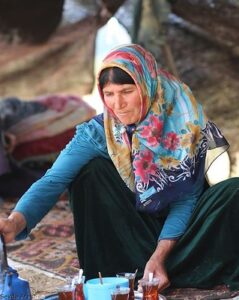
Tourists gather yearly to see the Yörük caravans depart their winter coastal homes for their summer pastureland in the Taurus Mountains. Excitement abounds. Sheep and goats walk single file, bells ringing. The huge loads of tents and equipment carried by camels are covered by colorful Turkish rugs. Women in their long, flowered skirts and young people dressed in their colorful best lend an air of festivity.
This 1,000 year way of life is vanishing as modernization infringes on traditional grazing rights and the younger generation look for an easier life with jobs in the city. In 2020, there were only eighty-six migrating families, and most of them used trucks and tractors to transport their animals. This yearly migration was disrupted by covid travel bans, and it will be difficult to overcome the loss of livestock.
The Yörük (name derived from the Turkish verb meaning to walk) are a Turkish tribal group numbering 463,000. They are Sunni Muslims, but Shamanistic practices of the past, such as warding off evil spirits, still exist. Their language is a dialect of Turkish (Balkan Gagauz Turkish) and has no Scriptures.
Yörüks are honorable with strong moral principles. They are frugal, but also warmly hospitable, offering visitors foods like butter, cheese, yogurt, and perhaps meat. The Yörük value cleanliness and freedom but will never be clean from sin and have true freedom without Christ.
Spring 2021
The Brunei Malay people are a native Malay ethnic group that live in Brunei, a little-known nation on the island of Borneo. The country is tiny (a little larger than Delaware), but enjoys the wealth from oil resources. The Brunei also live in Malaysia, Canada, and the United States. The in-country population is 184,000; the worldwide population is 556,000.
Their language, also called Brunei Malay, is different in sound from Malay. Brunei Malay is the language of everyday communication for most Bruneians and is a sign of a speaker’s wish to identify himself as Bruneian. Brunei Malay is currently replacing the minority languages. There is no Bible, and no other known Christian resources in this language.
Brunei’s government is a monarchy with a line of sultans dating back to the 14th century. The current sultan became the absolute ruler in 1967. As such, he is both the head of state and the head of government. He is also at the head of the official religion, Islam, which he promotes by building mosques. (It is estimated that Brunei has more mosques per square kilometer than any other country in the world.) He also protects Islam by making it illegal to proselytize or for Muslims to convert from Islam.
The future is uncertain. Rapid depletion of oil reserves is an economic concern. The helpless state of lost souls, however, is of greater concern. How shall they hear? Pray for laborers!
Winter 2020-21
The Tama people live in eastern Chad and western Sudan. Statistics vary according to source; reports include a population of anywhere from 170,000 to 300,000. The Kimr tribe, numbering 169,000, belongs to the Tama people group and speaks the same language.
Tama (also known as Tamok, Tamot, or Tamongobo) is a language in which tone, stress, and length can all change the meaning of words. It is the language spoken in homes. It is unknown if Tama has ever been written or is only spoken. There are no Scriptures in this, the people’s heart language.
The Tama are sedentary and most of them are farmers of an assortment of crops, including cereals. They also raise livestock such as goats and camels. Because Chad is a landlocked country, they do not always have a long rainy season which means that drought is a serious problem. Gardens are the main livelihood and source of food. If the rains do not come, they may not have any crops that year. This is compounded by fights with neighboring people over the desperately needed land. There is much unrest, and one never knows when bandits or rebels will strike.
Islam is the main religion of the Tama with 95% claiming to be Muslim. The other 5% is made up of ethnic and animistic religions. Because of their extreme poverty and sense of hopelessness, alcohol is a real issue for many Tama. When will they hear the great news of the Gospel? Who will bring them hope? Will you go?
Fall 2020
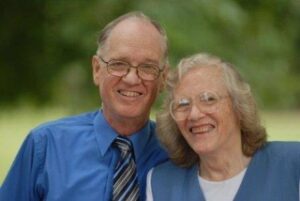
Bob and Liz PattonSuriname is situated on the northern coast of South America. Its history is almost as diverse as the vegetation that grows in its tropical climate; Suriname was first explored by the Spanish in the 16th century, settled by the British in the mid-17th century, and became a Dutch sugar colony in 1667. Indigenous populations and escaped African slaves were pushed into the interior of the country where they established their own tribal languages and cultures.
Since Suriname didn’t gain independence from the Netherlands until 1975, the national language is Dutch, but because Suriname has been influenced by so many countries and cultures, an English-based creole language called Sranantongo is spoken by a majority of the population as either a first or second language.
Along with linguistic influence, the Dutch also brought Moravian influence (followers of John Huss) in the early 18th century who translated the New Testament and Psalms into Sranantongo in 1820. Unfortunately, this translation was not very precise, and its language is now archaic. In the 1970s, a Bible translation group (SIL) began working in Suriname to translate the New Testament into Sranantongo from the Critical Text. In 1998, Robert Patton, MD, DD finished his translation of the entire Bible from the Received Text a few years before the Critical Text (SIL) New Testament was completed.
To date, Dr. Patton’s translation has sold over 20,000 copies: enough to put the complete Bible into the hands of one in twenty-five people. To God be the glory!
Summer 2020

The ancient home of the Aymara is perched twelve-thousand feet above sea level on the Altiplano, a high plateau near Lake Titicaca in the Peruvian Andes. Although life is challenging due to very poor soil and a region susceptible to both drought and flood, the nearly three hundred thousand Southern Aymara have found a way to sustain a vibrant culture. Fulfilling social obligations is very important in these communities, which are usually composed of large family groups. Each person takes part in the husbandry and agricultural tasks that are central to their lifestyle.
To a casual visitor, it may seem the Aymara people have already embraced the Gospel. However, while the name of Jesus and the symbol of the cross are common, these people are just a step away from paganism. Four hundred years ago, they were first introduced to Christianity by Catholic missionaries. In response to these new teachings, the Aymara simply blended Christian terminology and stories with animism, creating a folk-religion that worships both Jesus and natural “spirits.”
The Southern Aymara have no Bible to lighten their darkness and expose the error of their beliefs. While the Central Aymara do have a Bible translation, its dialect is so different from Southern Aymara that it is considered to be an entirely different language. There is no Bible translation in process for the Southern Aymara. Meanwhile, they continue to live and die deceived and in darkness.
Spring 2020
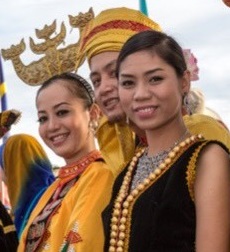
The 750,000-900,000 souls comprising the Bajau or Sama people are dispersed throughout the Malaysian section of Borneo and are thought to have originated in the Philippines. There are various Bajau languages, and they are mutually unintelligible. While some of the Bajau have Bible translations or Gospel resources, at least one of them—the West Coast Bajau people— have no known Gospel resources: no Bible, no New Testament, not even a John and Romans! Although there is now a translation process underway, it could be years before its completion. Meanwhile, more than 250,000 souls remain Bibleless.
The West Coast Bajau (WC Bajau) were once sailing nomads, but have since settled along the northern and western coasts of Borneo, adapted to an agricultural lifestyle, and adopted Islam. Because of language mixing between the vernacular and the national language (Malay), “pure” WC Bajau is increasingly rare. Written WC Bajau existed only informally until the last thirty years when linguists, trying to encourage literacy in both Bajau and Malay, began working on formalizing an orthography. Both of these factors—a transitioning spoken language and a young, if not underdeveloped, written language—only serve to complicate Bible translation work among the WC Bajau.
Please pray for a reliable Bible translation for the WC Bajau as well as the development of literacy and other Bible resources.
Winter 2019-20
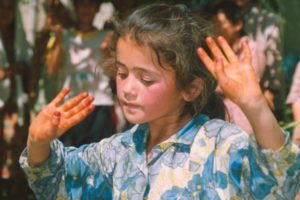
The Pamiris of Central Asia have never had their own country nor lived independently of surrounding powers. The majority of Pamiris live in an area called the Badakhshan Autonomous Province which covers parts of Tajikistan and Afghanistan.
Pamiris are linguistically, religiously, and culturally distinct from their Tajik and Afghani landlords. They are a highly misunderstood people group and face great prejudice and discrimination. This is primarily due to a difference in the practice of Islam.
Most Pamiris practice Ismailism which is viewed negatively by their Sunni neighbors. Pamiri women are free from some of the stricter Islamic laws. They do not have to wear burkas or hijabs, are encouraged to get a good education, and are allowed to work outside the home. Although dating is not acceptable and marriages are usually arranged by a maternal uncle, women are not expected to marry before age eighteen.
It is unclear how many distinct languages/dialects exist in the Pamiri language family. A BBTI graduate working with this people group says there are at least seven. There are only three teams currently working to translate the scriptures into Pamiri languages.
Fall 2019

Hidden deep in the mountains of southwest China, the Bunu people are like a treasure waiting to be found. Many of the small Bunu villages are inaccessible by any type of vehicle. The Bunu went into hiding when they were forced to flee the Hunan valley due to violent persecution from the Han and Zhuang peoples.
The kinship system of the Bunu is matrilineal, meaning they trace their descent through their mother’s line, not their father’s. Bunu women are the leaders of their homes; when marital problems arise, the man may go back to his family and the woman may find another husband. If this occurs, the man has no rights to any property.
Bunu legends passed down for generations have a worldview based on a chaotic world before their god, Pan Hu, built the heavens and created the earth and hint at a worldwide flood.
Since the Bunu have little contact with the outside world, it is understandable that they are the largest people group in China without a single known church. A significant hindrance in reaching the Bunu is the language diversity. Currently, there are no Scriptures in any of the Bunu language groups, leaving over 450,000 people without the Word of God in their heart language! What will it take to reach these people? Someone must penetrate geographical, cultural, and language barriers with the powerful Word of God! Will it be you?
Summer 2019
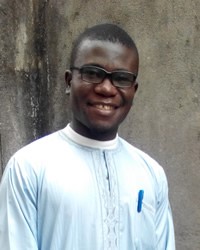
The Malinké are moral people and are dedicated to their people, to obedience, and to honesty. They possess a driving sense of human dignity; selfishness and lack of hospitality are the two deadly sins that defile their dignity. Yet morality is nothing apart from Christ. There are no known believers and there are no Scriptures in Malinké. These are a friendly and open people, just waiting for someone to bring them the truth.
Malinké influence permeates the country’s economics, politics, and religion. If they had the truth, imagine how influential they could be in reaching others. Will you help get the Gospel to them?
Fall 2018
“Avilakoa!” a man cries out to you from beside the dirt path. His long white robe brushes the ground as he stands watching over his cattle. In the distance, you see a village of mud houses and hear the sound of women calling out to each other as they get water and prepare food. This is a village of Fur people and you have just been greeted with a “good morning!”
The Fur people live in the Darfur region of Sudan. They are also located in Egypt and Chad, but the word Darfur means “the homeland of the Fur.” There are 1,164,000 Fur people in Sudan and a total of 1.2 million globally. They are primarily Sunni Muslim. Many men cannot hope to be married unless they have memorized several pages of the Quran, and they are promoted to authority depending on how well they know the Quran.
In recent times, these people have been embroiled in bitter conflicts. Because of drought and desertification, war over resources has arisen between the Arab and indigenous people. In 2003, the Fur people banded together with two other indigenous groups to demand reparation for the oppression they suffered. In response, the government sent a guerilla force to attack the civilian population of these tribes. Hundreds of thousands of civilians were killed and over a million refugees have fled their homeland and sought refuge in Chad and other areas.
Pray for peace in the Fur’s homeland. Also pray they would know the peace that comes from knowing Christ as their Savior.
Summer 2018
Tucked away, high in the northeastern mountains of Pakistan, live the Hunza people. They are also known as the Burusha. These people lived for hundreds of years in complete isolation until a highway was built that brings many tourists to see the beauty of the Himalayan mountains contrasted with the lush, terraced gardens of the Hunza farmers. The Hunza people are renown not only for their beautiful valley but also for their long life span. The average lifespan in Pakistan is sixty-seven years, but in Hunza it is not uncommon to live well over one hundred years! Some people speculate that this amazing life span is influenced by their healthy and active lifestyle as well as the annual two-to-four month juice fast. During these months, they eat nothing and drink only the juice from dried apricots.
The people of Hunza claim to be descendants of three soldiers in Alexander the Great’s army who were left behind because of sickness. They say that each of these soldiers founded a village and all Hunza people are descendants of one of these three villages. Most Hunzas follow Islam and know nothing of God or the Bible. What use is long life if they do not know of eternal life? Many tourists go to see the beauty of the Hunza valley, but who will take them God’s Word? They smile, but they do not know true joy. They live without hope, knowing nothing of God’s love. Who will go? Someone must reach them before it is too late.
Spring 2018